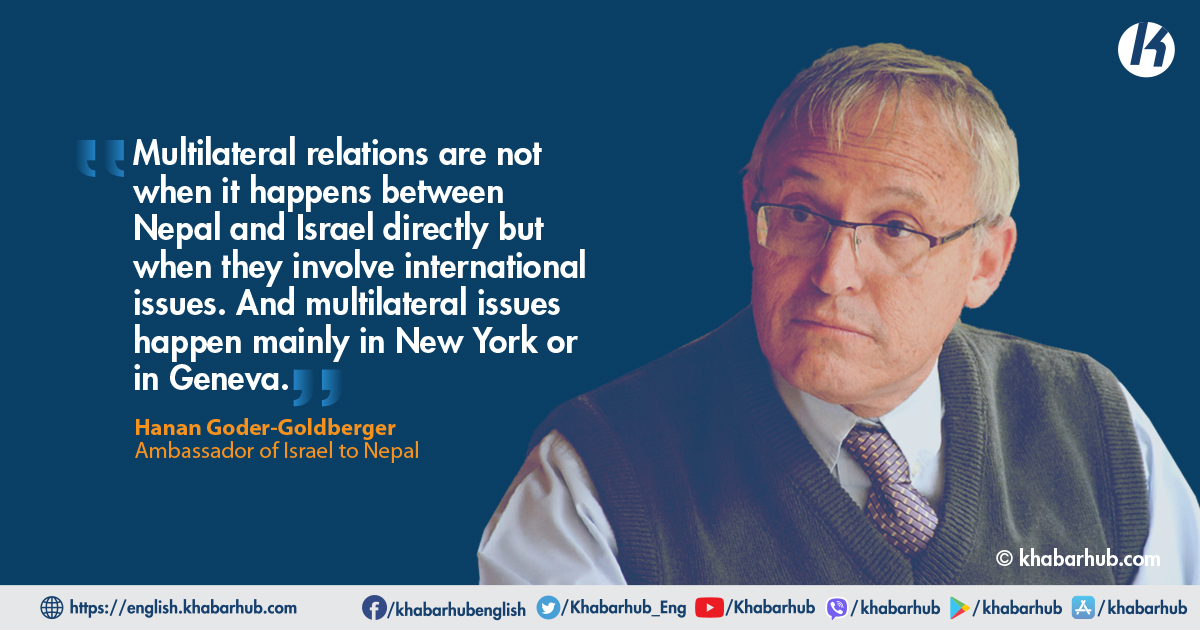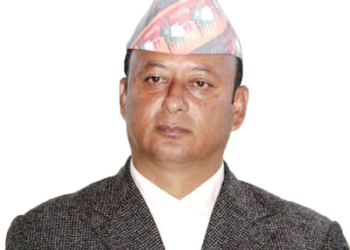Hanan Goder-Goldberger is currently serving as the Ambassador of Israel to Nepal.
Ambassador Goldberger previously served as Israeli ambassador to South Sudan and Eritrea in 2014.
He also served as the coordinator of the International Governmental Committee for students in Agriculture.
Besides, he also served at several positions at the Ministry of Foreign Affairs and at several missions such as Norway and Nigeria. He can speak English, Hebrew, Arabic and Norwegian.
Dr. Pramod Jaiswal, Strategic Affairs Editor at Khabarhub, spoke to Hanan Goder-Goldberger, Ambassador of Israel to Nepal on Nepal-Israel relations.
It’s been almost six decades since Nepal and Israel signed diplomatic relations. How do you look at bilateral relations between Nepal and Israel?
When I look at the last six decades of the relations between the two countries, I think that a lot of good events and cooperation have happened.
But let me first appreciate the courageous step that was taken by the first democratically elected B.P. Koirala in 1960 AD.
It was a courageous step of a great leader. Israel will never forget the fact that Nepal was the first and the only one from this part of the world, for many decades, to keep relations with the state of Israel.
And I think that it is a pride for Nepal that it was leading this process and I know later many other countries joined. But when I look at the bilateral relations, a lot was achieved, a lot was gained and the bilateral relations between the two countries are excellent.
Agriculture is a major sector of Nepal. It is the backbone of Nepal’s economy. How has Israel been supporting Nepal in this sector?
The agricultural sector in Nepal is crucial, important and I should almost say the soul of Nepali society.
Sixty percent of Nepalis are engaged in agriculture. Their income, lifestyle comes from agriculture.
In Israel, the situation is different. Only two percent of the population is in agriculture.
And that two percent produce food for the 98 percent and at the same time Israel is exporting food. There is no magic.
This is what we are proud to share with Nepal. In the last decade, we have taken 3000 Nepalis to Israel for training on the “Learn and Earn Project” together with “Sana Kisan Bikas Bank”.
Through the project, they have been spending a year working and learning Israeli agriculture.
They’ve been earning money, going to college, carrying out research, and eventually returning to Nepal bringing back the Israeli culture of work.
And when I visit all over the country, I see the graduates from the project. 3000 people are a big number. I see them all over the country applying and making modern agriculture.
And this is the biggest challenge. The people here must understand that the old agriculture is no longer relevant, we must move forward to modern agriculture.
Your big neighbors are hard-working and smart.
And if you will not move forward with this technology, you are left behind. So in this aspect, I think this cooperation of knowledge, of the culture of work, is very important.
When they go to Israel, the students understand the most important thing, i.e. in agriculture if you invest a thousand rupees you will collect five thousand rupees in return.
Agriculture is not a hobby, it’s a business, a profession, and a way of life.
And this is something that I think is beginning to change here.
And I can tell you, with the amazing agricultural potential that you have here in Nepal with different climates and very fertile land and hard-working people, Nepal will, in the next ten years, be able to begin exporting foods.
If you continue this trend, in just a few years, Nepal will be able to export food because of more productivity. But you have a challenge, as you have to make investments, make a change in the concept, remaining with the old agriculture will not lead you anywhere.

The trade between two countries is very nominal. How do you look at the possibility of increasing it?
We are both small countries. A lot of the trade is done through India. So it is not counted. But I think that the items that Israel is exporting, you are not aware of, for instance, if you look at your mobile phone whether the software inside is Israeli or the medical equipment and so on.
As I mentioned before, Nepal has a lot of agricultural products to export, your tea is amazing, your coffee is of high quality, other products like ginger, I am talking about cash products.
Rice is amazing but rice cannot bring in a huge amount of money. And I think, in some places, of course, to grow rice this is the best place, but in some places maybe you should make shifts to produce more things. The textile in Nepal is now beginning.
So I think in a few years we will see a great change in events/trends here also in the economic field and I think this will automatically increase the trade between the two countries.
What are the current priorities of Israel in Nepal?
Israel is a very small country. But people are not aware. Israel is the size of one of the seven provinces of Nepal. The priority for us in Nepal is to continue the good relations, to continue the excellent bilateral cooperation and sharing of knowledge, of scholarships, of opportunities between the two countries.
And I am sure that we will continue this trend of cooperation. A few years ago we celebrated the fact that we are very near, although we are the two extremes.
Nepal has the highest point in the world, Everest, and Israel has the lowest place in the world, the Dead Sea.
So, although we are both extremes, we have issued stamps on that. We exchanged stones. We have two stones taken from basecamps from Everest and are in the Dead Sea. And we have taken two stones from the Dead Sea and they are in Namche Bazar in the headquarters of the park.
So all these are symbolic things that show the connection between the two nations, between the two people. And this is going on and on and we are very happy with it.
Nepal is a developing country. So how can Israel help Nepal in its development?
We are giving scholarships. And the idea behind this scholarship is very unique to Israel; not like other countries. We are taking people in the middle of their career, to upgrade them, they stay in Israel for a month or two or three and they share, they learn Israeli experience and bring them back to Nepal.
It’s no brain drain like in other places because when you take people that have positions they come back to their families and to their work.
And I think we see this group of graduates in the shalom club, the group of people that studied in Israel. We have thousands of them and they are all over in all fields of the economy, of agriculture, of education, the health sector, of NGOs, wherever you go you will find these people.
And I think that this is good cooperation between the two countries. So we will continue with that as well.
Let’s come to multilateral relations. How can Nepal and Israel work together at bilateral as well as multilateral levels?
Relations have two legs. You have the bilateral leg and the multilateral leg. While the bilateral leg is excellent as we just mentioned there are some issues on multilateral.
But first, we have to understand what multilateral relations are. Multilateral relations are not when it happens between Nepal and Israel directly but when they involve international issues.
And multilateral issues happen mainly in New York and also in the Human Rights Council in Geneva and in International Organizations. We expect that excellent bilateral relations will also affect the level of multilateral relations. Unfortunately, we are yet to see it. There are no effects so far.
And we are looking for improvement of multilateral relations which means that Nepal votes in International Organizations on issues that are related to Israel and are related to the Middle East. We will be happy to see the improvement.
What are your impressions on Nepal?
I will take the slogan of Tourism, Nepal once is not enough. This is my second tenure in Nepal, and I think that you have lovely people, lovely heritage, lovely culture, lovely natural treasures all over the country.
Please preserve it. You have treasure wherever you go in the country. I wish and hope that Nepalis will be able to preserve it. Protect your environment, it’s very fragile.
The environmental problem that we see in your neighboring countries can reach here if we continue to neglect it. So, I really wish for Nepal to continue to preserve and conserve its heritage.
Watch video:









Comment